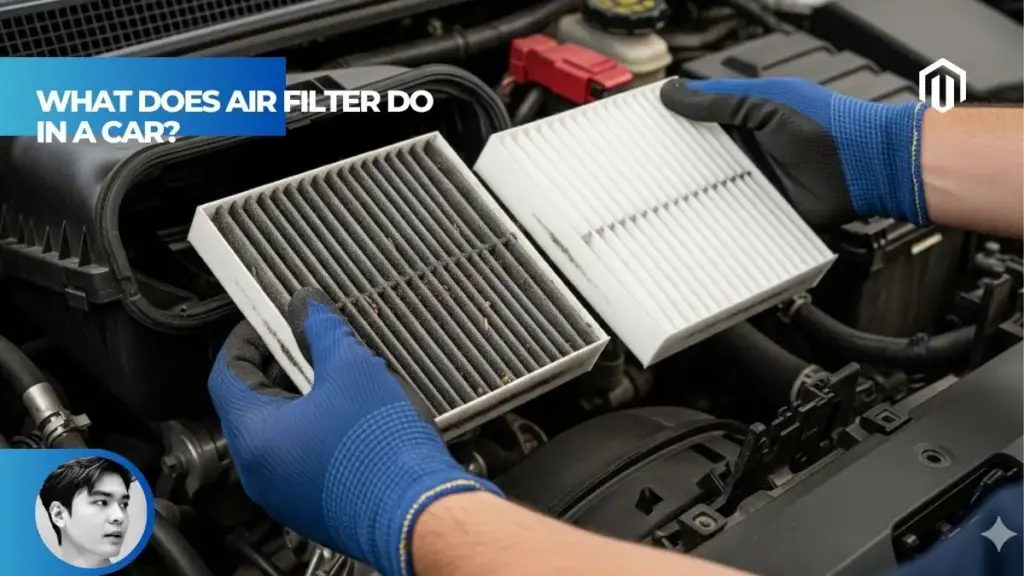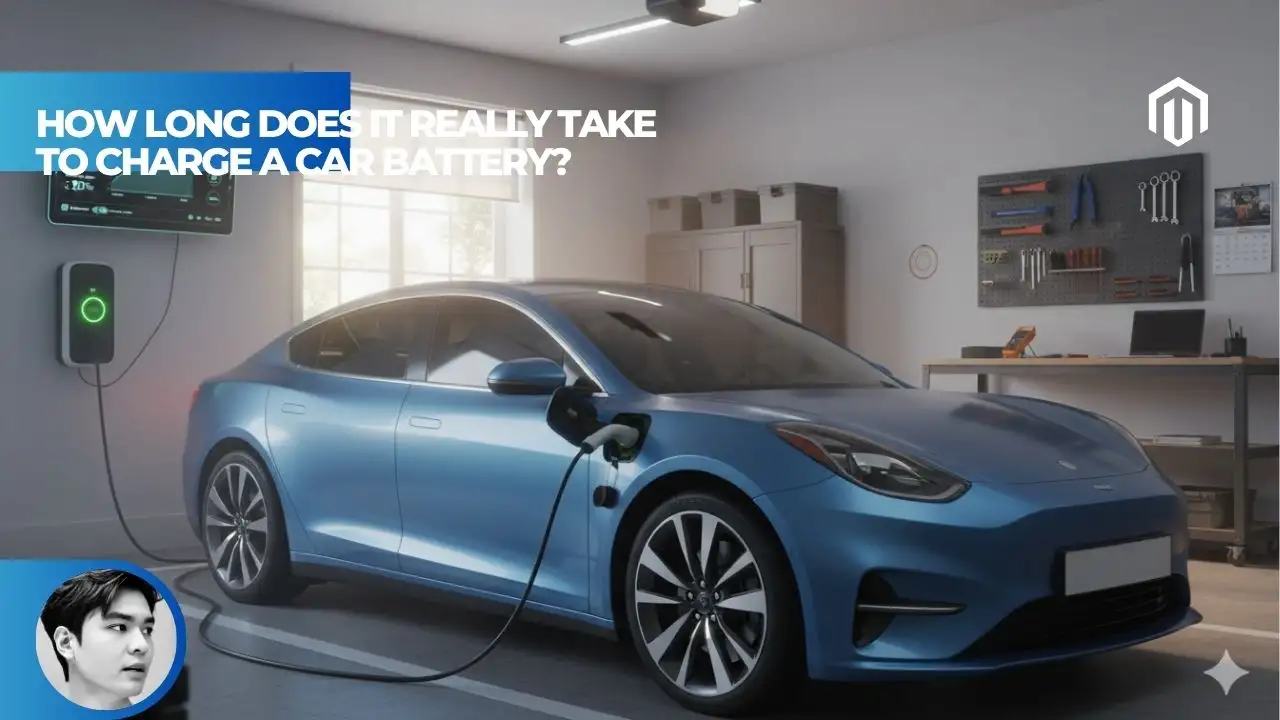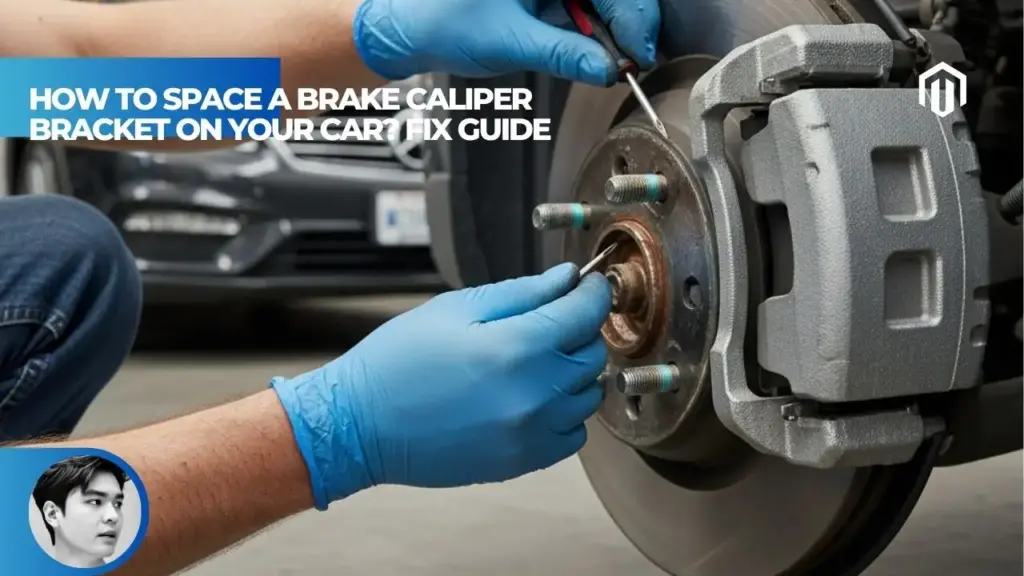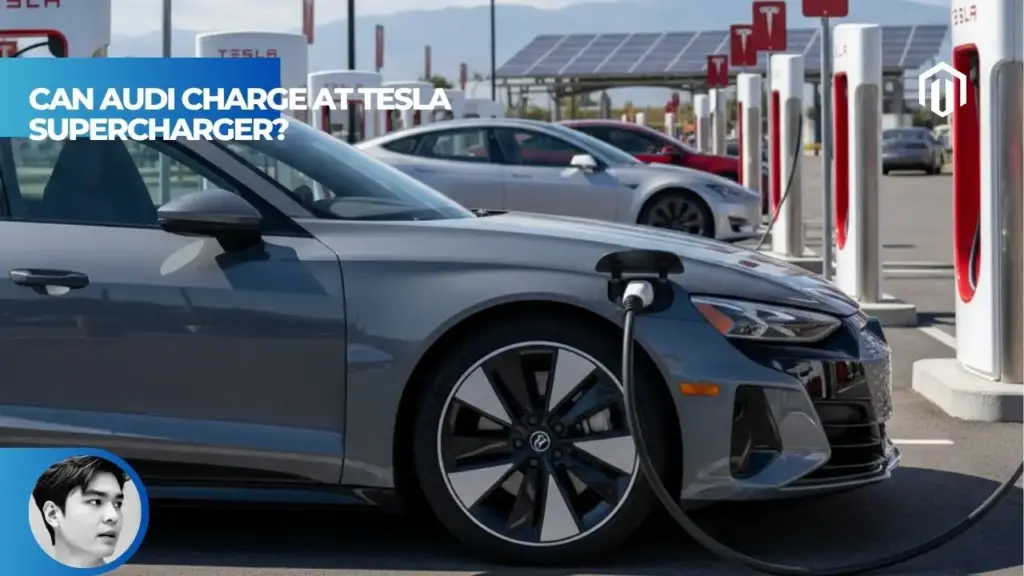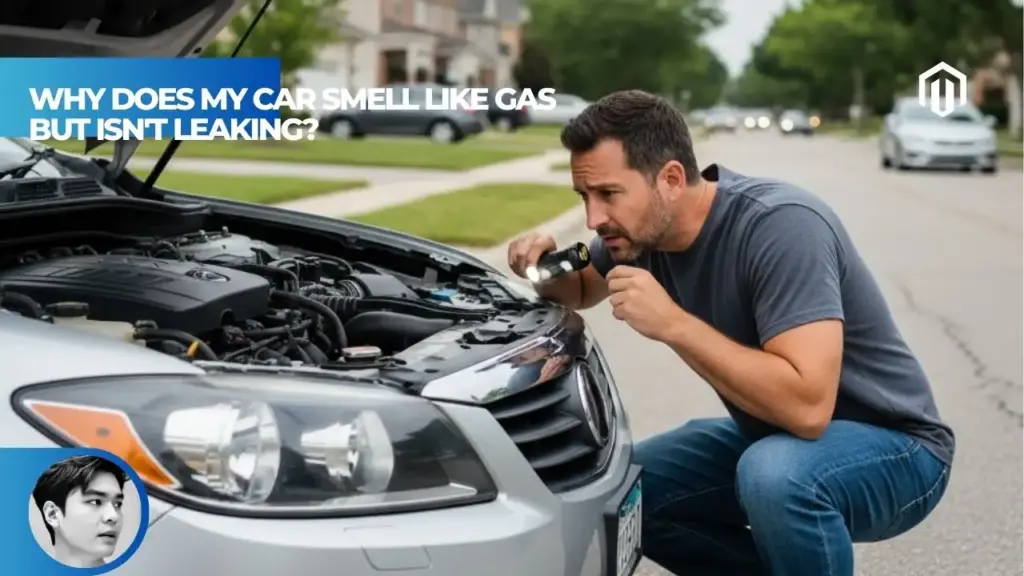You may also like:
- 【Explained】What Does a Car Air Filter Do? Your Guide to Engine Health
- 【Explained】What Is a Microfilter on a BMW? (A Full Guide)
- 【Explained】How to Fix Car AC Blowing Hot Air? DIY Troubleshooting Guide
- 【Explained】What Car Has the Best Air Conditioning for the Back Seat? (Full Guide)
- 【Explained】What Engine Does the BMW i8 Have? Full Hybrid Powertrain Explained
A car has two main air filters: the engine air filter that cleans air entering the engine for combustion and protects internal components from debris, and the cabin air filter that purifies air entering the passenger compartment through the HVAC system. Both filters require regular replacement, with clogged engine filters causing reduced performance and poor fuel economy, while dirty cabin filters create uncomfortable breathing conditions and musty odors inside the vehicle.
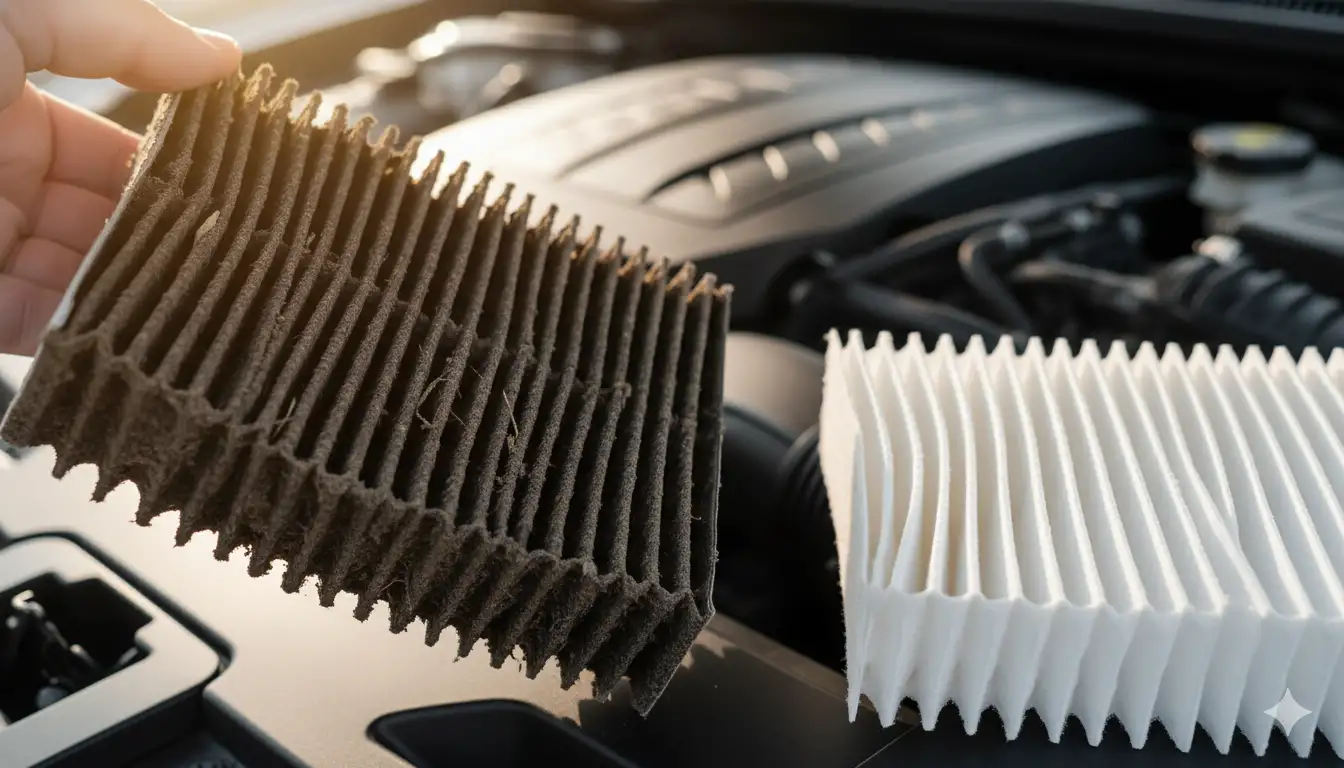
What Is the Main Purpose of an Air Filter in a Car?
Understanding your vehicle’s air filtration system helps prevent costly repairs and ensures comfortable driving conditions. Most drivers don’t realize their car contains multiple air filters, each serving distinct critical functions.
The Two Air Filters in a Car
Modern vehicles contain two primary air filters: the engine air filter and the cabin air filter[1]. When purchasing a vehicle, understanding these components helps with future maintenance planning. The engine filter sits in the engine bay, typically in a black plastic box, while the cabin filter hides behind the glove compartment or under the dashboard.
Protects Engine from Dirt and Debris
The engine air filter acts as your engine’s first line of defense, preventing dirt, dust, leaves, and insects from entering the combustion chamber. Without this protection, abrasive particles would cause premature wear on pistons, cylinders, and valves, potentially leading to catastrophic engine failure[2]. A single grain of sand can scratch cylinder walls, creating permanent damage.
Clean Air for Combustion Process
An internal combustion engine requires approximately 10,000 gallons of air for every gallon of fuel burned. This massive air volume must be clean to ensure proper combustion efficiency. The filter ensures optimal air-fuel mixture ratios, directly affecting power output and fuel economy.
What Does a Car Filter Trap (Dust, Pollen, Bugs, Sand)
Engine air filters capture various contaminants including:
- Road dust and dirt (particles as small as 5 microns)
- Pollen (seasonal allergen protection)
- Insects and bugs (prevent clogging)
- Sand and salt (road debris)
- Leaves and organic matter (parking under trees)
Engine Air Filter – The Engine’s First Line of Defense
The engine air filter performs crucial protective functions that directly impact vehicle performance, longevity, and operating costs.
What Does the Engine Air Filter Do?
The engine air filter cleans incoming air before it mixes with fuel in the combustion chamber. According to Autvex experts, this filtration process removes 99.5% of harmful particles that would otherwise damage sensitive engine components. Performance vehicles like the BMW 2-Series use advanced filter designs to maximize airflow while maintaining protection.
How Does a Car Engine Air Filter Work?
The filter uses pleated paper or cotton material arranged in accordion-style folds to maximize surface area[3]. As air passes through, particles become trapped in the filter media while clean air continues to the engine. The pleated design increases filtration capacity by up to 50% compared to flat filters.
Engine Air Intake Filter and Air-Fuel Mixture
Proper air-fuel mixture requires 14.7 parts air to 1 part fuel for optimal combustion. The filter ensures consistent airflow rates, preventing:
- Rich running conditions (too much fuel)
- Lean running conditions (too much air)
- Incomplete combustion
- Carbon buildup
Prevents Debris from Entering Engine Components
Without filtration, contaminants would cause:
| Component | Damage Type | Repair Cost |
|---|---|---|
| Pistons | Scoring and wear | $1,500-3,000 |
| Cylinders | Wall scratching | $2,000-4,000 |
| Valves | Premature wear | $800-1,500 |
| Turbocharger | Blade damage | $1,000-2,500 |
Cabin Air Filter – Protecting Passenger Health
The cabin air filter serves a completely different purpose, focusing on passenger comfort and health rather than mechanical protection.
What Does the Cabin Air Filter Do?
The cabin air filter purifies air entering the passenger compartment through the heating, ventilation, and air conditioning (HVAC) system[4]. [Premium air conditioning systems] rely heavily on clean cabin filters for optimal performance.
What Is a Pollen Filter?
“Pollen filter” is another name for the cabin air filter, emphasizing its role in removing allergens from incoming air. During spring and fall, these filters trap:
- Tree and grass pollen
- Mold spores
- Dust mites
- Pet dander
- Ragweed particles
Filter for Car Air Conditioning System
The cabin filter protects HVAC components by preventing debris from reaching:
- Evaporator core (cooling element)
- Heater core (heating element)
- Blower motor (air circulation)
- Air ducts (distribution system)
This protection extends component life and maintains system efficiency.
Cleans Air Inside the Car for Breathing
Modern cabin filters remove particles as small as 0.3 microns, improving air quality for:
- Allergy sufferers
- Asthma patients
- Children and elderly passengers
- Drivers in polluted areas
Some premium filters include activated carbon layers that neutralize odors and harmful gases like carbon monoxide and nitrogen oxides.
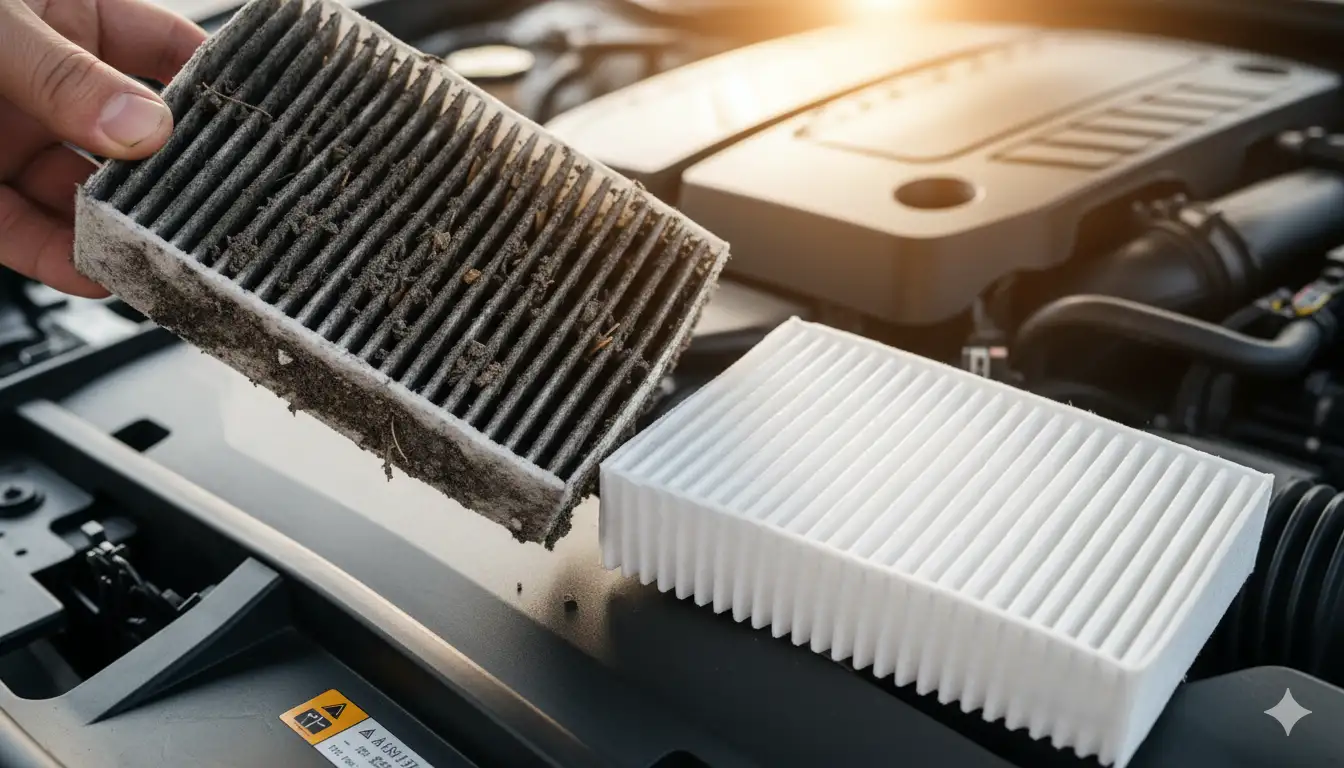
Engine Air Filter vs Cabin Air Filter – Key Differences
Understanding the distinctions between these filters helps prioritize maintenance and recognize symptoms of filter problems.
Location and Purpose Comparison
The fundamental differences include:
| Feature | Engine Air Filter | Cabin Air Filter |
|---|---|---|
| Location | Engine bay, air box | Behind glove box/dashboard |
| Purpose | Protect engine | Protect passengers |
| Air destination | Combustion chamber | Passenger cabin |
| Accessibility | Easy to reach | More difficult |
Impact on Vehicle Performance vs Comfort
Engine filter impacts:
- Acceleration power
- Fuel economy
- Engine longevity
- Emissions levels
Cabin filter impacts:
- Air quality
- HVAC efficiency
- Passenger comfort
- Odor control
Some vehicle models have known issues with filter maintenance accessibility.
Maintenance Schedule Differences
According to Autvex’s maintenance database:
- Engine air filter: Every 12,000-15,000 miles (normal conditions)
- Cabin air filter: Every 15,000-30,000 miles
- Severe conditions: Replace both 50% more frequently
Severe conditions include dusty roads, construction zones, and high-pollution areas.
Cost to Replace Each Filter Type
Current replacement costs average:
Engine Air Filter:
- Part cost: $15-50
- Labor: $20-40
- Total: $35-90
Cabin Air Filter:
- Part cost: $15-40
- Labor: $30-50
- Total: $45-90[5]
Symptoms of a Dirty Engine Air Filter
Recognizing these symptoms prevents engine damage and maintains optimal performance.
Reduced Gas Mileage
A clogged engine air filter can reduce fuel economy by up to 10%[6]. Fuel-efficient vehicles are particularly sensitive to airflow restrictions. The engine compensates for reduced air by burning more fuel, creating a rich-running condition.
Sluggish Acceleration
Restricted airflow causes:
- Delayed throttle response
- Reduced passing power
- Difficulty climbing hills
- Lower top speed
Performance loss becomes noticeable when the filter reaches 50% restriction.
Black Smoke from Exhaust
Excessive fuel burning creates visible black exhaust smoke, indicating:
- Incomplete combustion
- Carbon buildup
- Potential catalytic converter damage
- Failed emissions testing
Engine Misfires and Check Engine Light
Severe restriction triggers:
- Random misfires (P0300 code)
- Mass airflow sensor errors (P0101)
- Oxygen sensor faults (P0171/P0174)
- Check engine light illumination
Dashboard warning lights often indicate filter-related issues.
Symptoms of a Dirty Cabin Air Filter
Cabin filter problems affect comfort and health rather than mechanical performance.
AC Smells Musty
A saturated cabin filter develops mold and mildew growth, creating:
- Musty basement odor
- Sour or vinegar smell
- Persistent bad odors
- Allergic reactions
Weak AC Airflow
Restricted cabin filters cause:
- 25-50% airflow reduction
- Longer cabin cooling times
- Uneven temperature distribution
- Increased blower motor strain
AC performance issues often stem from clogged cabin filters.
Increased Allergens and Dust in Cabin
Failed filtration leads to:
- Visible dust on dashboard
- Frequent sneezing or coughing
- Itchy eyes while driving
- Window film buildup
HVAC System Strain
Blocked filters force the blower motor to work harder, causing:
- Premature motor failure ($200-400 replacement)
- Increased electrical draw
- Blown fuses
- Unusual motor noises
Maintenance and Replacement Guidelines
Proper maintenance prevents expensive repairs and ensures optimal performance.
How Often to Change Engine Air Filter
Standard intervals:
- Normal driving: 12,000-15,000 miles
- Dusty conditions: 6,000-8,000 miles
- Highway driving: Up to 20,000 miles
High-mileage vehicles may require more frequent changes.
How Often to Change Cabin Air Filter
Replacement schedule:
- Standard: Every 15,000-30,000 miles
- Allergy sufferers: Every 10,000 miles
- Urban areas: Every 12,000 miles
- Rural/dusty: Every 8,000-10,000 miles
How to Check Engine Air Filter
Inspection steps:
- Locate the air box (usually black plastic)
- Unclip latches (no tools required)
- Remove filter carefully
- Hold to light (should see some light through)
- Check for tears or damage
Replace if excessively dirty or damaged.
Can I Clean My Air Filter?
Paper filters: Cannot be cleaned effectively; replacement required
Reusable filters: Can be cleaned with special solutions
Cotton/oiled filters: Washable but require re-oiling
Most OEM filters are disposable and cost-effective to replace rather than clean.
Related Filter Components
Understanding related components helps diagnose problems and maintain overall vehicle health.
Air Filter vs Oil Filter
Key differences:
| Aspect | Air Filter | Oil Filter |
|---|---|---|
| Medium filtered | Air | Engine oil |
| Replacement interval | 12,000-15,000 miles | 3,000-7,500 miles |
| Function | Prevent debris ingestion | Remove metal particles |
| Cost | $15-50 | $10-25 |
Air Filter vs Fuel Filter
Both protect the engine but filter different substances:
- Air filter: External contaminants
- Fuel filter: Fuel system impurities
- Both affect performance when clogged
- Combined replacement saves labor costs
What Is a Mass Airflow Sensor?
The mass airflow (MAF) sensor measures air entering the engine and works with the air filter[7]. Modern vehicles use MAF data for precise fuel injection. A dirty air filter can contaminate the MAF sensor, causing:
- Poor fuel economy
- Rough idling
- Starting problems
- Check engine lights
What Is a Cold Air Intake?
Performance modifications include:
- Larger filter surface area
- Heat-shielded air path
- Increased horsepower (5-20 HP)
- Enhanced engine sound
Cold air intakes require more frequent filter maintenance due to increased airflow.
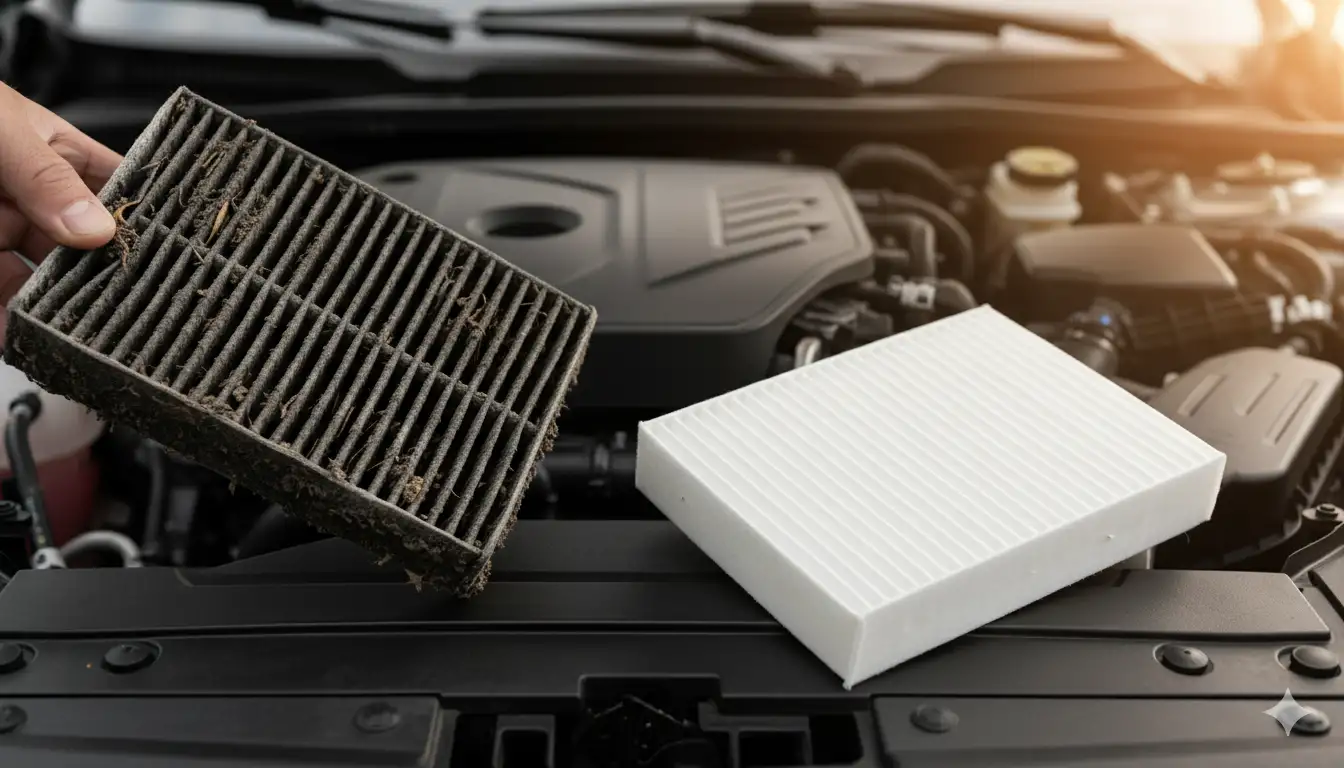
Key Takeaways
- Two distinct filters serve different purposes: engine protection vs. passenger comfort
- Engine filters affect performance: reduced power, poor fuel economy, potential damage
- Cabin filters impact health: allergen exposure, air quality, HVAC efficiency
- Regular replacement prevents problems: 12,000-15,000 miles for engine, 15,000-30,000 for cabin
- DIY replacement saves money: both filters typically cost under $50 each
- Symptoms indicate replacement need: sluggish acceleration or musty AC odors
- Severe conditions require frequent changes: dusty areas need 50% more frequent replacement
Decision Path / Next Steps
Check your owner’s manual for filter replacement intervals, inspect your engine air filter every 12,000 miles, and replace cabin filters annually or when you notice musty odors or reduced airflow. Consider having both filters checked during regular oil changes to maintain optimal vehicle performance and cabin comfort.
Start by locating your engine air filter in the engine bay – it’s typically in a large black box with clips or screws. During routine maintenance, ask technicians to show you both filters’ condition.
Document replacement dates in your maintenance log. Many shops provide free filter inspections during oil changes, though be prepared for upselling if filters appear marginally dirty. Learn to inspect filters yourself to make informed decisions.
If experiencing symptoms like reduced fuel economy or weak AC airflow, check the appropriate filter first before assuming worse problems. Insurance claims don’t cover neglected maintenance, making prevention crucial.
Budget approximately $100-150 annually for both filters if professionally installed, or $30-80 for DIY replacement. Online tutorials specific to your vehicle model simplify the process. Most filters require no tools for replacement.
Consider upgrading to premium filters if you have allergies or live in polluted areas. HEPA-grade cabin filters and high-flow engine filters cost slightly more but provide superior protection. Quality components extend service life and improve performance.
Finally, establish a replacement schedule based on your driving conditions. Urban drivers need more frequent cabin filter changes due to pollution, while rural drivers require more frequent engine filter replacement due to dust. Mark your calendar or use maintenance apps to track intervals.
Frequently Asked Questions
What is the main purpose of an air filter in a car?
The main purpose is twofold: the engine air filter protects the engine by filtering dirt and debris from combustion air, while the cabin air filter cleans air entering the passenger compartment for health and comfort.
What is the difference between an engine air filter and a cabin air filter?
Engine air filters clean air for combustion and protect engine components in the engine bay, while cabin air filters clean air entering the passenger compartment through the HVAC system, located behind the glove box or dashboard.
What are the symptoms of a dirty engine air filter?
Common symptoms include reduced gas mileage, sluggish acceleration, black exhaust smoke, engine misfires, rough idling, unusual engine noises, and potentially triggering the check engine light.
What happens if I don’t change my car’s air filter?
Neglecting the engine filter causes reduced performance, poor fuel economy, and potential engine damage. Ignoring the cabin filter results in poor air quality, musty odors, reduced HVAC efficiency, and possible blower motor failure.
How often should I change my engine air filter?
Typically every 12,000-15,000 miles under normal driving conditions, or every 6,000-8,000 miles in dusty or severe conditions. Always consult your owner’s manual for specific recommendations.
Does a new air filter improve gas mileage?
Yes, replacing a clogged engine air filter can improve gas mileage by up to 10% by ensuring optimal air-fuel mixture and reducing the engine’s work to draw in air.
Can a dirty air filter cause my check engine light to come on?
Yes, a severely clogged air filter can restrict airflow enough to cause misfires, oxygen sensor errors, or mass airflow sensor problems, all triggering the check engine light.
Does the engine air filter affect my car’s AC?
No, the engine air filter doesn’t affect AC performance. The cabin air filter is responsible for AC airflow and quality. However, both should be maintained for optimal vehicle operation.
How much does it cost to replace an air filter?
Engine air filters typically cost $35-90 total (parts and labor), while cabin air filters cost $45-90. DIY replacement reduces costs to just $15-50 for parts.
Can I drive my car with a dirty air filter?
Yes, but it causes reduced performance, poor fuel economy, and risks engine damage over time. Replace dirty filters promptly to avoid expensive repairs and maintain optimal operation.
What are the two air filters in a car?
The two main filters are the engine air filter (protects engine, ensures clean combustion air) and the cabin air filter (cleans interior air for passenger health and comfort).
References
- Colonial Chevrolet. (2025). Engine Air Filter vs. Cabin Air Filter: What’s the Difference? https://www.colonial-chevy.com/engine-air-filter-vs-cabin-air-filter.htm
- FRAM. (2023). Dirty Air Filter Symptoms. https://www.fram.com/vehicle-maintenance-center/post/dirty-air-filter-symptoms
- Champion Auto Parts. (2024). Different Types of Engine Air Filters. https://www.championautoparts.com/en-eu/products/light-vehicles/filters/air-filter.html
- AutoZone. (2… (2023). Understanding Engine vs Cabin Air Filters. https://www.autozone.com/diy/air-intake/engine-air-filter-vs-cabin-air-filter-2
- J.D. Power. (2023). How Much Does It Cost To Replace A Cabin Air Filter? https://www.jdpower.com/cars/shopping-guides/how-much-does-it-cost-to-replace-a-cabin-air-filter
- Car Treatments. (2023). 8 Signs Your Engine is Gasping for Air. https://cartreatments.com/dirty-air-filter-symptoms/
- MosPart. (2024). Symptoms of a Clogged Engine Air Filter. https://mospart.com/symptoms-of-a-clogged-or-dirty-engine-air-filter/

I am a senior automotive analyst at Autvex. Expert vehicle evaluations, in-depth reviews, and objective analysis helping readers make informed automotive decisions with years of industry experience.

